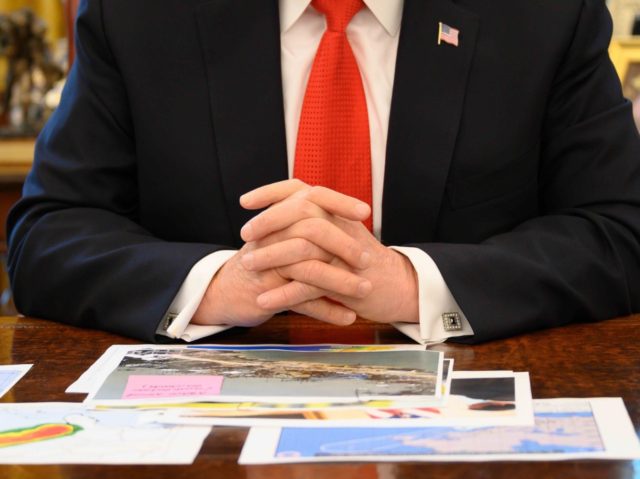President Donald Trump has been projecting a sense of uncertainty and frustration for the past several weeks. If he is not careful, he may encourage nervous voters to look past the Democrats’ radical policies and chose the opposition.
At the start of his presidency, Trump projected a refreshing sense of optimism about the economy and the country as a whole. That confidence, combined with deregulation and tax cuts, helped accelerate economic growth and create new jobs, bringing Main Street the prosperity only Wall Street enjoyed under Barack Obama.
But now, Trump is looking and sounding nervous.
This week, he wasted a great deal of energy defending his claim that Alabama was in the potential path of Hurricane Dorian. That seemed plausible earlier, when the hurricane had been projected to strike Florida directly. It could have — as hurricanes have done in the past — crossed the peninsula and threatened the Gulf Coast. Even if wrong, Trump would have earned high marks for staying more engaged on a hurricane than any of his predecessors had done.
Instead, Trump was determined to deflect criticism. At a White House briefing, he produced a map that appeared to have been changed clumsily to include Alabama. The press obsessed over “Sharpiegate”: as William Jacobson of the Legal Insurrection blog noted, “These people completely failed to do their jobs under Obama. Now they’re compensating by obsessing over every stupid little thing under Trump.” Yet Trump could not let it go, either.
His policies are still working; even the trade war with China has been less damaging than experts predicted. A stunning new Harvard/Harris poll this week reported that two-thirds of Americans support the president’s fight with China, even though a large majority also expect it to hurt the U.S. more than the Chinese.
The problem is that Europe is facing economic stagnation. That, in turn, has hurt the U.S. economy. Manufacturing contracted last month for the first time in three years, thanks to weak exports (not just to China) and a strong dollar.
One obvious answer would be to weaken the U.S. dollar by lowering interest rates. But the president cannot force the Federal Reserve to do that. And the Fed likely contributed to slower U.S. growth in recent months by raising rates too quickly. That will gave it more flexibility to lower rates if the U.S. economy does begin to approach recession. But the rate hikes may also have made a recession more likely. And Trump is powerless to reverse them.
So the president’s frustration is understandable. And he has few tools, other than Twitter, to pressure the Fed to ease up before it is too late.
Unfortunately, Trump’s tweets criticizing the Fed have reinforced the perception that there is something to worry about. And, at times, his language toward Fed chair Jerome Powell has been unduly harsh.
In foreign policy, unpredictability is an asset. In domestic policy, and economic policy, it is proving to be a liability.
There is another economic factor that has been overlooked in most recent commentary: namely, the Democrats’ win in the 2018 midterm elections. Speaker of the House Nancy Pelosi leads a caucus that wants to raise taxes, restore heavy-handed regulations, and — if the majority of House Democrats has their way — impeach the president. That has created more uncertainty about the economic future. Trump can do nothing about that until 2020, at earliest.
The recent spate of mass shootings also seems to have rattled the president. Of course, the left has been grotesquely unfair in blaming him. Former vice president Joe Biden, for example, has been telling Democrats across the country there was a “direct line” between Trump’s rhetoric about illegal immigration and the mass shooting last month in El Paso, Texas.
By that logic, Biden and his former boss would be responsible for the Dallas police murders in 2016: after all, the Obama-Biden administration — as Biden likes to call it — supported the Black Lives Matter movement.
The grim truth is that Trump may not be able to stop mass shootings — any more than Obama could. None of the proposed gun control measures that Democrats push at every opportunity would have any significant effect. And even were Trump to agree — as he did in banning bump stocks — he would not receive any credit for his actions.
Twitter has been a useful tool for Trump to transcend the filter of the mainstream media and frame national debates. His attacks on the so-called “Squad” of radical left-wing Democrats, for example, made them the face of their party.
Trump’s 2020 rivals are too busy with their radical “political revolution” to notice — at least for now — that America needs reassurance more than disruption. If Trump wants to win, he will need to figure that out before they do.
Joel B. Pollak is Senior Editor-at-Large at Breitbart News. He earned an A.B. in Social Studies and Environmental Science and Public Policy from Harvard College, and a J.D. from Harvard Law School. He is a winner of the 2018 Robert Novak Journalism Alumni Fellowship. He is also the co-author of How Trump Won: The Inside Story of a Revolution, which is available from Regnery. Follow him on Twitter at @joelpollak.

COMMENTS
Please let us know if you're having issues with commenting.